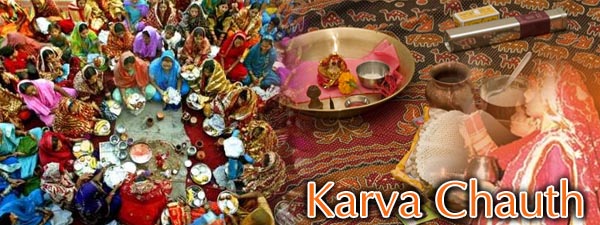|
Karva
Chauth is one such occasion when most married Hindu women in North
India seek the blessings of God for their husband's long life. Karva
Chauth is observed on the fourth day of the dark fortnight of Ashwin,
which is also called Kartik according to some calendars.
Though
it is a day marked with neither food nor water, this festival is
quite popular among the newlyweds. A few days before the festival,
markets are full of items needed for the festival. The preparations
for this festival start a week in advance. Appointments are made
with beauty parlours, hands are decorated with intricate mehendi
designs and jewelery and cloth merchants do a brisk business.
The
Start Of The Day
On this day the women get up before sunrise. They worship Shiva,
Parvati, Ganesh, Kartikeya and the moon. The blessings of the Gods
are invoked for longevity and prosperity of their husbands and children.
Mothers-in-law give their daughters-in-law sumptuous food called
'Sargi' to eat before sunrise, as the fast starts before sunrise
and ends only after worshiping the moon at night. It is a tough
fast, as the women do not take any food or water.
Dressing
Up
In the evening, the women to cherish the joy of adorning bridal
finery. Many times, the newly wed wear their wedding dress on this
auspicious occasion, usually the ghagra-choli or Banarsi saris,
embellished with the old-new shimmer of gold, diamonds and rubies.
After dressing up, she receives gifts from the mother-in-law.
Evening
Puja
Before evening, the married woman receives the baya or a basket
full of goodies from her mother, which is meant for the mother-in-law.
The basket contains sweets, mathadi, fruits and a sari. Before the
sun sets, most of the women in a locality gather in one house and
prepare a corner for the puja. This puja chowk is beautifully decorated
and a small platform is prepared against a wall. On this, the image
of Gauri Mata or Goddess Parvati is placed. In the olden days, this
image was made of cow-dung.
The
Process Of Puja
The women sit around this image with their bayas. Each woman also
places a karva or a pitcher full of water and seven pieces of pua
in front of her. It is adorned with kharia, aipun and a little roli.
A red thread is tied around the karva. At the beginning of the puja,
women apply the roli teeka to Goddess Gauri and also to themselves.
With the thumb and the third finger of the right hand, water is
sprinkled on the image of the goddess. The same procedure is repeated
with aipun and roli . Lastly, rice is showered on the image.
Narration
of Vrata Katha
An elderly woman of the family narrates the legend of Karva Chauth.
Even a widow can narrate this story. The women then pray for the
long life and welfare of their husbands. While chanting the prayers,
they pass their bayas from one to another. The wait for the moon
rise begins after sunset, and as soon as the moon is sighted, prayers
are offered to the moon. The fasting women first observe the moon
through a sieve and then break their fast. The first sip of water
and the first morsel of food is offered by the husband. A sumptuous
dinner follows.
|
